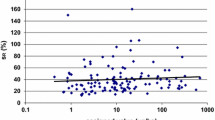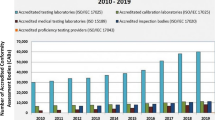Abstract
Proficiency testing involves the performance of test procedures on routine samples by a number of laboratories. Interlaboratory proficiency testings provide multiple benefits to participants since they play a key-role in the total quality control of laboratory activities. They serve as a means of self-improving, as a mechanism of continuing education and as a source of information for accreditation agencies. This review highlights basic principles, benefits, criteria and capabilities of a proficiency testing programme for food analysis laboratories as well as their role in the implementation of rapidly developing food control legislation.
Similar content being viewed by others
References
Council Directive 93/43/EEC, 14 June 1993,Hygiene of Foodstuffs.
Council Directive 88/320/EEC, 9 June 1988,Inspection and Verification of Good Laboratory Practice (GLP).
Council Directive 89/397/EEC, 14 June 1989,Official Control of Foodstuffs.
Author information
Authors and Affiliations
Rights and permissions
About this article
Cite this article
Brera, C., Miraglia, M. Proficiency testing programmes as a tool in food quality assurance: Overview of Italian experiences. Mikrochim Acta 123, 39–43 (1996). https://doi.org/10.1007/BF01244376
Issue Date:
DOI: https://doi.org/10.1007/BF01244376




